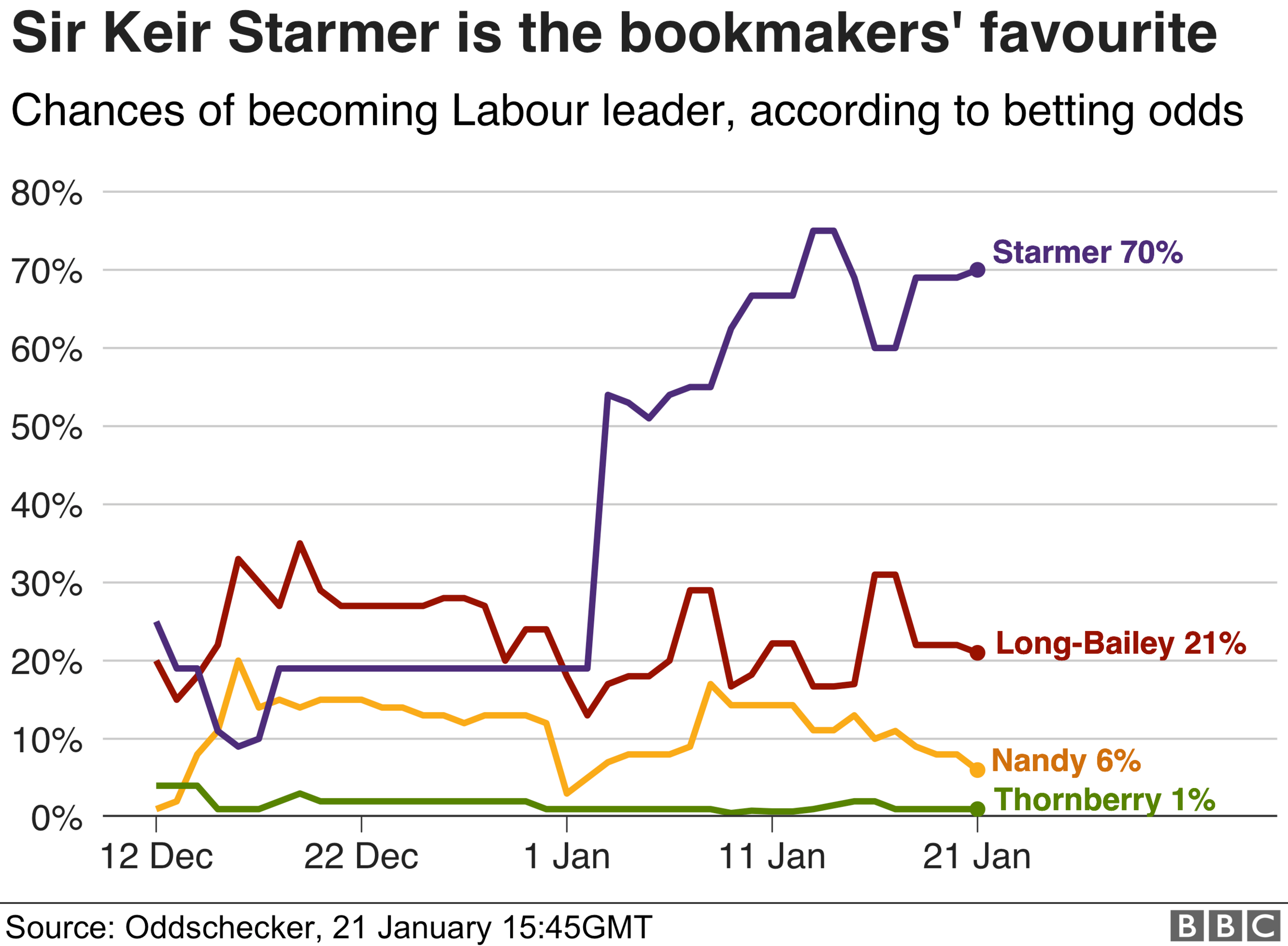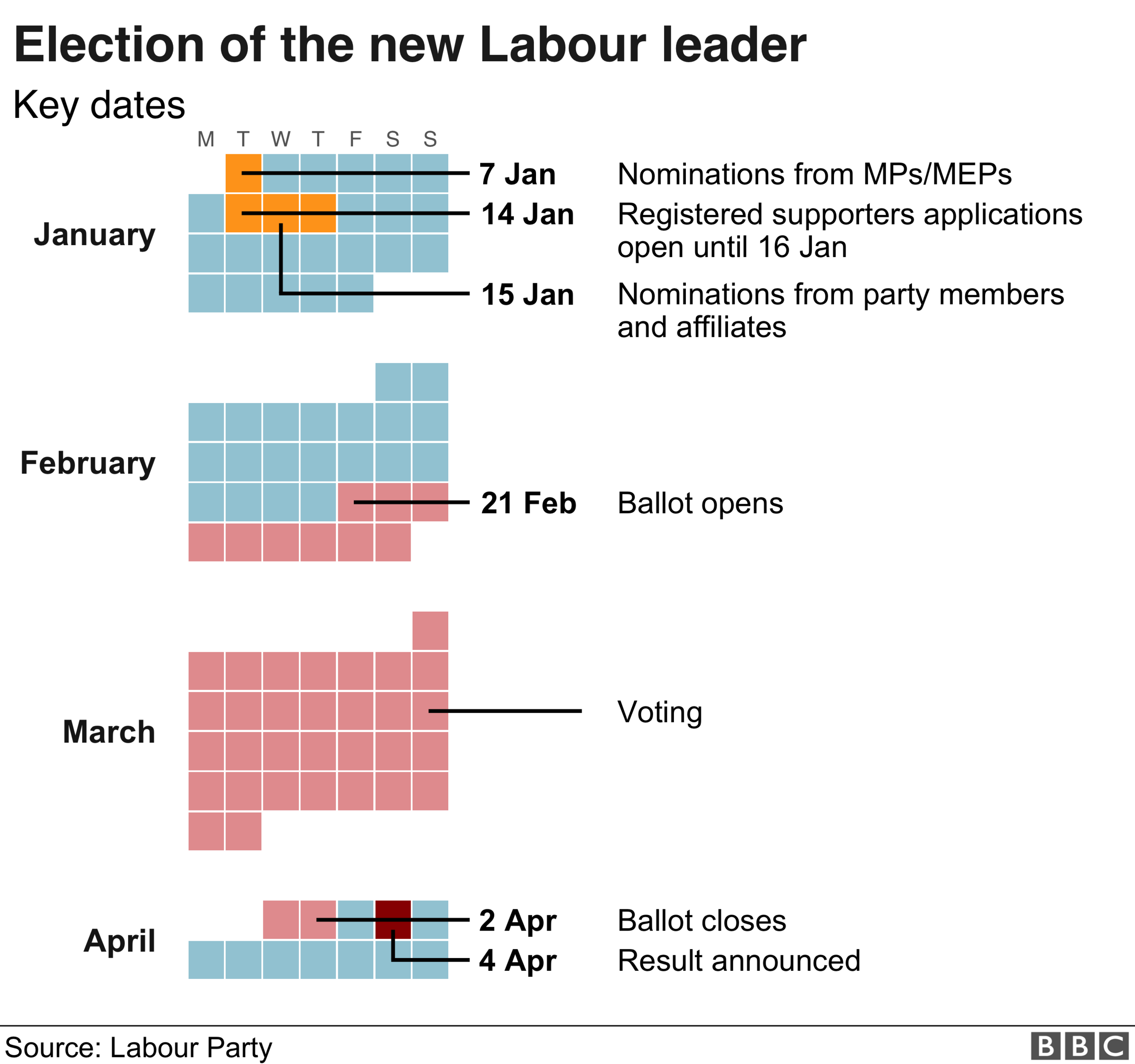Labour leadership: I can sell 'hope for the future', says Long-Bailey
- Published
Labour needs to sell a message of aspiration to voters, says Long-Bailey
Labour had "a great set of policies" at the general election but got its "messaging" wrong, Rebecca Long-Bailey has told the BBC.
"We should have been talking about aspiration," the Labour leadership contender said, but too often talked about "handouts" instead.
She said she had the ability to sell "a positive vision" and "hope for the future" that wins elections.
The race to succeed Jeremy Corbyn is down to four after Jess Phillips quit.
Shadow Brexit secretary Sir Keir Starmer and Wigan MP Lisa Nandy have made it on the final leadership ballot, after securing the necessary trade union and affiliated group support.
Emily Thornberry and Mrs Long-Bailey have yet to reach the threshold.
Ms Phillips said she would be happy with either Ms Nandy or Sir Keir as leader, but argued that Mrs Long-Bailey would be the wrong choice for Labour at this moment.
Mr Corbyn announced he would be standing down after Labour suffered its worst defeat, in terms of seats, since 1935 in December's election.
But Mrs Long-Bailey - whose campaign is backed by grassroots organisation Momentum - refused to blame the party's manifesto, saying she was "proud" of the policies in it.
Labour's "compromise position" on Brexit "didn't satisfy our communities and meant that we weren't trusted," she told the BBC's political editor, Laura Kuenssberg.
And, she added: "We didn't tackle anti-Semitism and we weren't trusted to deal with that issue within our own party."

The manifesto policies - which included nationalising utilities and a big increase in tax-funded public spending - were not drawn together into an "overarching narrative" that chimed with the electorate, she said.
"Our messaging really didn't resonate with voters. We should have been talking about aspiration and how all of the things within our manifesto would improve your life, would improve the outcome for businesses in our areas, but we didn't say that.
"Quite often we talked about handouts and how we will help people, rather than providing that broad positive vision of the future."
She said Labour had a history of talking "about how bad the Conservatives are" without "showing that real vision and hope for the future".
"That's what wins general elections, showing that real vision and hope for the future. And I know that I can do that and that's why I'm standing to be the leader of the party."
'Chinese takeaway'
The shadow business secretary said Labour did not do enough to "sell" her flagship policy, the Green Industrial Revolution, which she said "would have transformed our economy and delivered investment in regions and nations".
Rebecca Long-Bailey says she supports gender self-identification
"Whoever becomes leader, we have to reunite the party to make sure that we're unified in the message that we're putting forward. But we had many of the right answers to the right questions."
She also hit back at claims she was not forceful enough to be prime minister.
"I'm not shy. I mean, I have spent last four years, you know, locked in a room developing many of the policies that we've been trying to push forward as a party, but I don't think you could ever describe me as shy."
She said she believed her "forensic approach" to politics would be a challenge to Boris Johnson, whom she described as having "a bit of a struggling relationship with the truth and with detail".
On the prospect of being PM herself one day, she said she could picture herself living in 10 Downing Street, "chilling out" in her pyjamas on a Friday night, with "Netflix and a Chinese takeaway".
Trans rights
In a wide-ranging interview, Mrs Long-Bailey was asked whether she had any Conservative friends in Parliament.
"Not really, no," she replied, but added: "I'm friendly to everyone."
She said her non-political friends would not tell her if they supported the Tories "because I'd be angry".
She also reiterated her belief that women had a "right to choose" when it came to abortion and she was not in favour of changing the law, after a row over comments she made to Catholic priests during the general election.
And she backed a change in the law to allow transgender people to self-identify without the need for medical evidence.
Four candidates remain in the race for the Labour leadership
Labour's manifesto committed to reform of the Gender Recognition Act to allow self-identification, but critics warn it will make it easier for someone born as a man but now identifying as a woman to gain access to women-only spaces such as toilets, changing rooms, prisons and domestic violence refuges.
Asked whether she had any concerns about the policy, Mrs Long-Bailey said she understood the arguments, but Labour must "fully support our trans community".
Laura Kuenssberg interviewed Sir Keir last week and is aiming to interview Ms Thornberry and Ms Nandy in the coming weeks.

